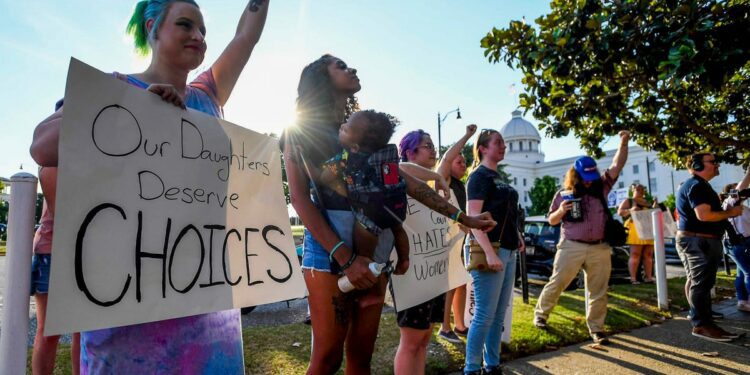SCOTUS keeps emergency abortions for those at health risk in Idaho
The Supreme Court dismissed the emergency abortion case, reversing its January decision to halt the procedures.
More than two years after most abortions became illegal in Alabama, the West Alabama WomenтАЩs Center still fields at least five calls a day from women seeking to end a pregnancy.
The staff has to tell callers they no longer provide abortion services.
тАЬAnd then when theyтАЩre told `No,тАЩ they ask, `All right. Well, where do I get one?тАЭ Robin Marty, the centerтАЩs executive director, told USA TODAY. тАЬAnd thatтАЩs when we canтАЩt say anything.тАЭ
The center is afraid of triggering an investigation from Alabama Attorney General Steve Marshall, who has threatened to bring criminal conspiracy charges against organizations that help Alabamians get the procedure out of state.
тАЬWe made it clear that we would not be doing anything that could possibly risk any of our staff getting arrested,” Marty said.
More: Two years ago, SCOTUS overturned the right to an abortion. Here is how each state changed
A federal judge may soon rule on whether Marshall has the power to do that, and the decision could have national repercussions.
If Marshall is successful, other anti-abortion states could follow his lead as out-of-state abortions have significantly increased since the Supreme Court ended the constitutional right to an abortion.
A loss for abortion rights advocates could further fire them up before the November election. Abortion access is already a top campaign theme for Vice President Kamala Harris, and the Biden administration has weighed in on the side of the organizations challenging AlabamaтАЩs attorney general.
The battle could find its way to the Supreme Court.
More: Supreme Court allowed emergency abortions in Idaho. Doctors say it’s not enough.
While the courtтАЩs 2022 decision overturning Roe v. Wade didnтАЩt address the issue of out-of-state abortions in the majorityтАЩs opinion, one conservative justice did mention it.
In a concurring opinion, Justice Brett Kavanaugh rhetorically asked if a state can stop one of its residents from traveling to another state to get an abortion.┬атАЬIn my view, the answer is no, based on the constitutional right to interstate travel,тАЭ Kavanaugh wrote.
But AlabamaтАЩs attorney general says the state is not barring women themselves from traveling.
тАЬIt is a mere reasonable regulation on certain assistance for interstate traveling,тАЭ Marshall wrote in a legal filing.
A violation of free speech and travel rights?
Before the stateтАЩs strict abortion ban kicked in, the Yellowhammer Fund offered financial and logistical assistance to women seeking abortions both in Alabama and, if necessary, in another state.
The nonprofit had prepared for the ban by developing relationships with clinics in states where abortion was likely to remain legal. The group developed referral and case management systems to respond to the expected increase in requests and planned for a bigger budget and more staff, according to a legal filing.
But those plans were canceled after the attorney general warned тИТ including in an August 2022 interview тИТ тАЬif someone was promoting themselves out as a funder of abortion out of state, then that is potentially criminally actionable for us.тАЭ
Yellowhammer stopped sharing information and support for out-of-state abortions. The organization sued Marshall in federal court, as did the West Alabama WomenтАЩs Center, a local doctor and another health clinic.
More: Supreme Court preserves access to widely used abortion medication mifepristone
U.S. District Judge Myron Thompson in Montgomery could rule any day.
The challengers argue that prosecuting someone for providing information and support for an out-of-state abortion would violate free speech and travel rights.
тАЬIf the attorney generalтАЩs attempt to go after helpers were sanctioned here, that could send a very strong and dangerous signal to anti-abortion politicians in other states who might resort to similar attempts to effectively impose what is a national ban on abortion for their residents,тАЭ said Meagan Burrows, an attorney with the American Civil Liberties Union who represents the health care providers challenging Marshall.
The stateтАЩs attorney general counters in filings that AlabamaтАЩs тАЬlegitimate objectives of prohibiting elective abortions and conspiracies to procure them cannot be achievedтАЭ if groups can evade the ban тАЬso long as they target out-of-state destinations.тАЭ
Out-of-state abortions doubled
Out-of-state travel for abortions doubled in recent years largely because of abortion bans and restrictions imposed by states after the Supreme CourtтАЩs 2022 decision ending the constitutional right to an abortion.
Nearly 1 in 5 people obtaining abortions traveled to another state to do so in 2023 compared with 1 in 10 in 2020, according to the Guttmacher Institute.
Patients in southern states, which have the┬аmost restrictive laws┬аin the country, had to travel across multiple state lines for care. Alabamians may have to go as far as North Carolina, Virginia, or Illinois for an abortion.
While the West Alabama WomenтАЩs Center lists a variety of resources for pregnant women on its website, including those related to abortion, the center said they canтАЩt do more than refer callers there.
More: FACT CHECK: Here’s what claims Kamala Harris got right and wrong during her DNC speech
тАЬThey ask us, `Which one should I click on?тАЭ Marty said. тАЬAnd we canтАЩt say.тАЭ
PatientsтАЩ reactions to the staffтАЩs inability to answer basic questions, Marty said, include everything from confusion to anger and depression.
One woman, a staffer later recounted, said in frustration: тАЬWell, if you can’t help me, I’m just going to try and drive my car into a tree, or I’ll pay somebody to beat me up because I’m not having this baby.тАЭ
тАЬAnd then she hung up,тАЭ Marty said.
`Testing the waters’
While the National Right to Life Committee, the country’s oldest and biggest anti-abortion group, is keeping an eye on the litigation, itтАЩs not promoting AlabamaтАЩs approach.
Ingrid Duran, who works on state legislative issues for the group, said she doubts that Alabama will win the case тИТ or that Marshall’s approach is an effective strategy for protecting fetal life.
Instead, the group is backing efforts to criminalize helping a minor get an abortion тАУ in or out of state тАУ without the consent of a parent.
тАЬThis is more about protecting parental rights,тАЭ she said of laws passed in Idaho and Tennessee.
But Duran said both those statesтАЩ laws and AlabamaтАЩs threat of prosecution are part of the anti-abortion movement’s exploration of the new territory created by the end of Roe v. Wade.
тАЬTheyтАЩre testing the waters to see what is permissible,тАЭ she said. тАЬWhat can states do to protect unborn life?тАЭ
Source link : http://www.bing.com/news/apiclick.aspx?ref=FexRss&aid=&tid=66d28dbcf3ac40868ff5e311b10fe0cb&url=https%3A%2F%2Fwww.usatoday.com%2Fstory%2Fnews%2Fpolitics%2F2024%2F08%2F27%2Falabama-prosecute-out-of-state-abortion%2F74954337007%2F&c=15213611159648890121&mkt=en-us
Author :
Publish date : 2024-08-26 23:14:00
Copyright for syndicated content belongs to the linked Source.












